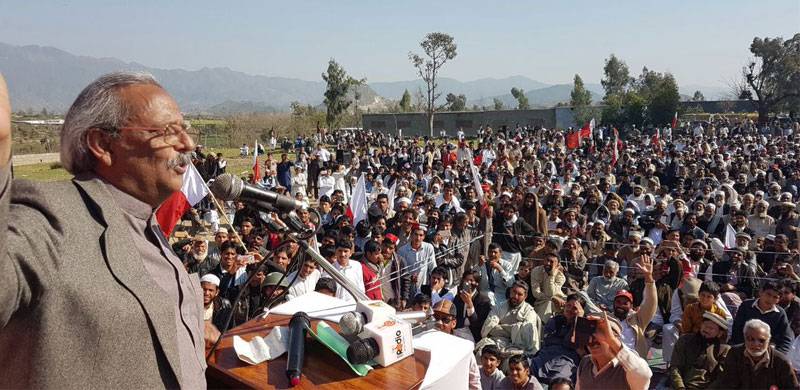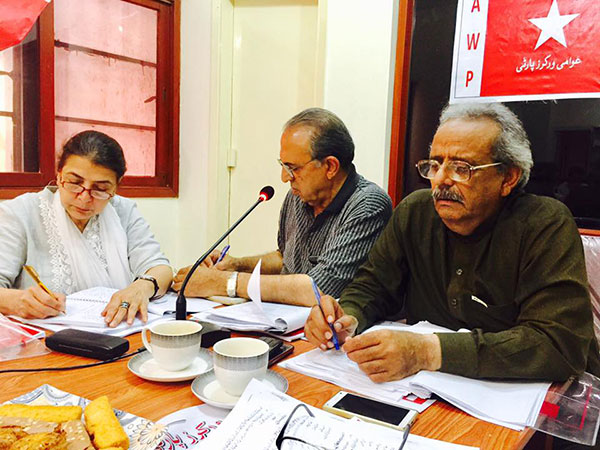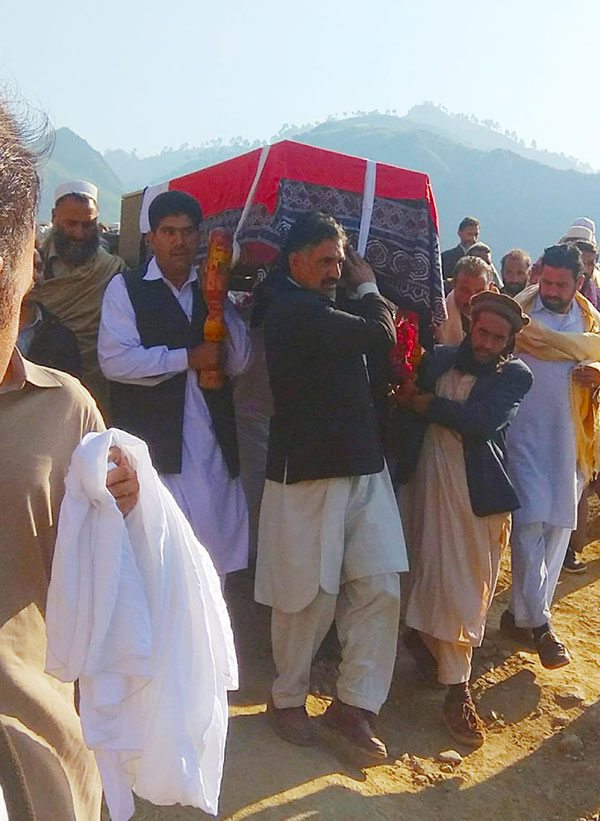
Comrade Fanoos Gujjar died last week. Given that I had only a tangential relation with him and his work and that there were wonderful tributes to him by other comrades I didn't find it my place to write over this huge tragedy. But his death is hushed over by not only the mainstream media but also by the debates and activity on social media which are excessively becoming a spin-off of mainstream media comedy. In that hierarchical structuring of debates and conversations it is becoming important to take note of the life struggle of comrade Fanoos Gujjar and what he meant to the resistance of the left.
I first came to know of Comrade Fanoos in around 2008-09 when friends from Gujjar community in universities of Peshawar were laying foundation of a Gujjar welfare society to help and encourage students from the community. Gujjars are the most socially deprived community of the region and a system of caste structure has been imposed which in tandem with the oppressive class structure of the wider society forces them to live in multifold jeopardy. Fanoos Gujjar rose from that community and rather than making grievance his mode of politics (which I believe would have been all legitimate) he erected networks of solidarity to fight the wider battle. He was the leading light to the students and youth of his community.

He spent his whole life in organizing a ground-level resistance and despite having very little resources of his own stayed committed to the politics of the left. He was the founding chairman of Awami Workers Party and his role in bridging the ideological and generational gap within the party, as mentioned by all the comrades, was unparalleled. As a friend pointed out he would be the first one to come to mind when you will think of a candidate of the left making it in the electoral arena. And he did well in constituency politics and was able to inject an agenda of the people in the right-wing and bureaucratic rhetoric of corruption and piety.
He stood like a solid rock with PTM and was arrested in Lahore while organizing the PTM rally there. His support for PTM is perhaps the singular contribution to the praxis of left from which we can learn politics of solidarity. As explained, his community faces no less discrimination in Pashtun society but he was not dismissive of the larger oppression faced by Pashtuns as a whole. He combined the inner struggle within the Pashtun society for equality and dignity with the struggle for the external political oppression Pashtuns are facing. This is perhaps the practical manifestation of class as understood by Marx and called as “identity-in-difference” by Spivak. There was a synergy in the oppression and with his firm support for PTM he proved that many struggles can go hand in hand and can complement each other rather than being contradictory or divergent. This is the lesson we, those fighting for Pashtun political rights, have to incorporate in our wider political struggle. One particular area where this concept of ‘identity-in-difference’ as practiced by Fanoos Gujjar can be worked on is the Pashtun feminist struggle. Pashtun women face multiple kinds of oppression and some activists are of the view that that struggle can take a backseat for now and first the question of external oppression has to be solved. Fanoos Gujjar proved that it is not necessary for that to be so.

Fanoos Gujjar lived a life where he proved that multiple struggles can be combined to form the basis of one large participatory and inclusionary struggle and politics of resistance. Throughout his life he was true to his commitment and in his death he has left us a legacy in how to organize a mass struggle of resistance.
Adieu Comrade!
I first came to know of Comrade Fanoos in around 2008-09 when friends from Gujjar community in universities of Peshawar were laying foundation of a Gujjar welfare society to help and encourage students from the community. Gujjars are the most socially deprived community of the region and a system of caste structure has been imposed which in tandem with the oppressive class structure of the wider society forces them to live in multifold jeopardy. Fanoos Gujjar rose from that community and rather than making grievance his mode of politics (which I believe would have been all legitimate) he erected networks of solidarity to fight the wider battle. He was the leading light to the students and youth of his community.

He spent his whole life in organizing a ground-level resistance and despite having very little resources of his own stayed committed to the politics of the left. He was the founding chairman of Awami Workers Party and his role in bridging the ideological and generational gap within the party, as mentioned by all the comrades, was unparalleled. As a friend pointed out he would be the first one to come to mind when you will think of a candidate of the left making it in the electoral arena. And he did well in constituency politics and was able to inject an agenda of the people in the right-wing and bureaucratic rhetoric of corruption and piety.
He stood like a solid rock with PTM and was arrested in Lahore while organizing the PTM rally there. His support for PTM is perhaps the singular contribution to the praxis of left from which we can learn politics of solidarity. As explained, his community faces no less discrimination in Pashtun society but he was not dismissive of the larger oppression faced by Pashtuns as a whole. He combined the inner struggle within the Pashtun society for equality and dignity with the struggle for the external political oppression Pashtuns are facing. This is perhaps the practical manifestation of class as understood by Marx and called as “identity-in-difference” by Spivak. There was a synergy in the oppression and with his firm support for PTM he proved that many struggles can go hand in hand and can complement each other rather than being contradictory or divergent. This is the lesson we, those fighting for Pashtun political rights, have to incorporate in our wider political struggle. One particular area where this concept of ‘identity-in-difference’ as practiced by Fanoos Gujjar can be worked on is the Pashtun feminist struggle. Pashtun women face multiple kinds of oppression and some activists are of the view that that struggle can take a backseat for now and first the question of external oppression has to be solved. Fanoos Gujjar proved that it is not necessary for that to be so.

Fanoos Gujjar lived a life where he proved that multiple struggles can be combined to form the basis of one large participatory and inclusionary struggle and politics of resistance. Throughout his life he was true to his commitment and in his death he has left us a legacy in how to organize a mass struggle of resistance.
Adieu Comrade!
